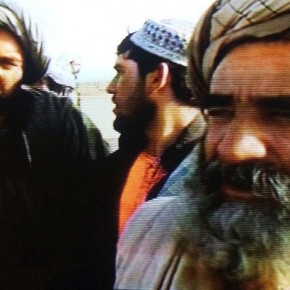In the late nineties The Cook Report secretly filmed Nick Griffin at a BNP rally. These were the first days of New Labour, when multiculturalism was replacing multiracialism as the umbrella term for diversity and tolerance. In one clip he says, “And they call it multiculturalism, they call it love, they call it respect for others… I’ll tell you what it is, it’s genocide!”
By now Griffin had made a name for himself as a Holocaust denier and had produced a pamphlet claiming the UK media is run by Jewish multiculturalists and leftists. In another clip, Griffin is even less restrained. “The capitalist free-traders, the Marxists, and organised Jewry, have declared war on the white man, not just in Britain, but in every nation on this planet.”
All conspiracy theories are worth investigating on one level or another. Particularly those of Griffin, as they tend to epitomize the mentality of his nationalist comrades-in-arms. There are several reasons. First, the presupposition that the shift of demography constitutes genocide; secondly, the believe that open borders are synonymous with dissolving nations; and thirdly, the relationship between globalisation and nation-states. As many white nationalists do, Nick Griffin sees a plot behind immigration as a plot to diversify Western societies, and thereby eliminate the white race. Globalization is an important element of that, though Griffin’s critique comes from the right, not the left.
Demographic change
The phrase ‘white genocide’ has become increasingly popular in recent years. No doubt it’s emergence in social media comes from the ‘peace dividend’ years of the 1990s, in which appeals to international law, human rights, and humanitarianism, succeeded anti-Communism as the principle pretext of military intervention. The people who claim there is a ‘white genocide’ taking place will often cite the UN, and specifically in regard to genocide and indigenous rights – as if the European were an endangered Native American tribe. It seems plausible this lay behind the first calls for ‘rights for whites’ in the first decade after the Cold War. It was an odd appeal for white nationalists who oppose cultural and political liberalism for its claim of race equality.
It should go without saying that the UN standards do not consider non-white immigration to constitute genocide. Nor does it take demographic changes to be a form of extermination. The full conspiracy theory comes into view with this claim. It’s not just globalisation set to rob entire nations of their sovereignty. It’s a plot to slowly destroy the white race by colonising their ancestral lands. The far right sees this behind immigration and multiculturalism and singles out the Left, Jews, and capitalist enterprise for blame. The theory has since been updated to focus on Muslim immigration, thereby trying to get past the accusation of racism. This is not a benign narrative: if immigration is genocide, then any means to end it can be justified.
The example of white farmers in South Africa is often raised in such circles. The picture of lonely islands of white desperation encircled by black hordes should not be accepted. Many of the farmworkers (who are often not white) end up killed in such raids. The reality of crime, as an economic phenomenon, is obscured in this racialization. In the narrative crafted by white nationalists the end of Apartheid has meant the defeat of an outpost of the white race by the ANC, the Communists, and the ‘traitors’ around FW de Klerk. For the racist, the deaths of white farmers are a part of a genocide launched by the anti-Apartheid movement.
So the very concession of equal rights in a liberal framework goes too far – it is genocide and racism against the white man, in fact – for the fascists. It reveals a lot about how race really works. In South Africa, it was the case that the classifications could suddenly oscillate and people would be reclassified and moved to another area and their documents completely altered. Who was ‘white’ was a complicated issue. The Japanese were considered ‘white’ because they were seen as an intelligent and industrious people. ‘White’ really comes down to class.
Open borders dissolve nations
Here we find race is reduced to genes and the nation is reduced to race in a völkisch equation of blood and soil. If you dissolve the racial stock of the nation, then you dissolve its nationhood. The extent to which racial categories do come down to genetic differences should never be overstated. Sure, there are genetic gaps and clusters of ancestry, but these are very slight. This is paralleled by just how uniform a species we humans are. Categorisation based on phenotype has proven far too crude to account for the varied and complex ways in which we are all heavily miscegenated. As genomes reveal, we are all nodes in networks and could not have done without each and every one of our ancestors.
Human civilisation has been spread by migration over the millennia. So when we come to talk about borders, we’re really engaging with a very recent subject. The UK and the rest of Europe have not had open borders in the literal sense, but rather an ebb-and-flow policy. Immigration has increased and decreased at different times in accordance with the thrust of the economy. It usually comes down to the need to replenish the supply of labour quickly. The free movement of labour within Europe may practice a form of open borders, but it cannot be said that this applies to non-white immigration. The borders have been eroded for capital, whereas the borders remain largely intact for labour.

It may be argued that the migrant workers may, not by any fault of their own, contribute to undermining the level of wages in the country in which they settle. This is not unique to immigrants. The unemployed undermine trade unions and wages as they serve as a standing army of labour reservists. It was a policy of mass-unemployment that the UK and US governments of the 1980s used to inflict a historic defeat on organised labour. Entire industrial areas of the economy were ransacked condemning a lot of people – particularly men – to a life dependent on welfare. All the while those who do go on to work in other areas will be helping to hold down wages for the rest of their class.
If we accepted the logic of the argument against immigration then we would be looking to ban unemployed people from ever get another job again. No one accepts this case, for good reason, so we should ask why it is so often argued in the case of so-called ‘foreigners’? Of course, this issue really requires us to reach beyond the confines set by free-market dogma. Closing the border is only a means of furthering exploitation at home and abroad. It only maintains the relative advantages in the country and ensures labour remains tied to the conditions there. It is as if the capitalist class is expected to cease exploiting the ‘native’ workers in the absence of ‘foreign’ workers. The real answer for all workers is to overturn the current order – and that’s the real nightmare of the far right!
Globalisation undermines the nation-state
Over the course of the last four decades, neoliberal globalisation took off and developed a rapacious momentum. Through international organisations such as the IMF and the World Bank, effectively guided by the US Treasury Department, entire regions of the world have been subjected to economic transformation. However, it is clear that there has been a proliferation of nation-states around the world and in other regions increased economic integration.
In the Balkans we have seen the breakup of Yugoslavia into small republics. It came about due to exogenous and endogenous forces. The US supported Milosevic as a reforming figure in the late 1980s, while he was busily eroding the autonomy of Kosovo and Vojvodina – in what would be the first move to hollow out ‘brotherhood and unity’ – empowering Serbia. The Reagan Administration founded the National Endowment for Democracy to provide support for right-wing nationalist elements within Yugoslavia. By that time, the Yugoslav economy, with its space for market forces, worker self-management, and state planning, was no longer delivering at the pace it once was.
The Bush Administration went further and withheld aid to Yugoslavia and made clear it would not send any more aid except to any republic which sought to secede. The European Community offered support to the Croats and Slovenes in their push for independence. Later, Germany would arm Croatia as Russia armed Serbia. Strobe Talbot has since confirmed that the fundamental reason for the bombing of Serbia in 1999 was not for the sake of Kosovar Albanians. It was because Serbia had not been quick enough in swallowing the Washington Consensus. Globalisation helped bring Yugoslavia to breakdown as the nationalist forces it awoke ran rampant. As soon as Croatia was independent, flying the same flag it did as a Nazi proxy, Franjo Tudjman oversaw crooked privatisation deals.
This should not surprise anyone. The forces of globalisation have the propensity to raise the number of borders in the world, while drawing such nations into its sphere of ‘structural adjustments’. Borders can block the movement of labour, but to capital they only provide barriers to be circumvented. There are movements for independence in Catalonia, as well as in Wales and Scotland. Even England has nationalists who want to see an independent English state. Notably, the right-wing Eurosceptic movements do not necessarily oppose neoliberalism itself. UKIP actively stand for more privatisation and deregulation, just as Croatian nationalists did after they gained their national independence. It would seem right-wing nationalism and liberal internationalism run on the same circuit.
The national myth requires longevity for the nation to attain its legitimacy (particularly, as most nation-states are founded in most unjust ways). The same applies to questions of race. The vast migrations of human history have been glossed over in the classification of various characteristics into racial categories, which presuppose homogeneity. Just as homogeneity is really constituted by once-heterogeneous populations, nations carved out of the map in a blip – compared to the whole of human history – become the prime movers of politics.
The national is impossible without the international. The world system in which nation-states are currently embedded, has no opposition to their existence. It is necessary, for the far right, to assert the opposite in order to account for the absence of the organic society. Its alternative vision is based on racial purity, with countries like England standing tall on its own. It’s a means to disregarding any systemic analysis in order to preserve the market-driven system it supposedly opposes.
Photographs courtesy of Joel Schalit.





